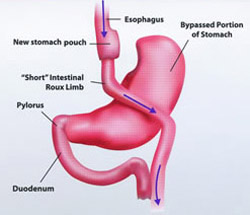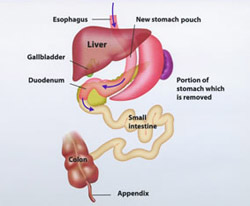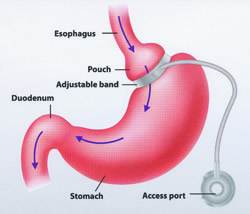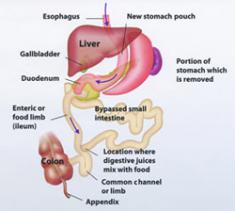Risks & Concerns
Bariatric surgery has been shown to be very effective at producing significant and sustained weight loss. Several different types of bariatric surgery are performed through our program:
Each surgical weight-loss procedure is different, with its own concerns and benefits. Please take a moment to become more familiar with the details, concerns and benefits of each procedure to help you understand which one may be right for you.
Roux-en-Y Gastric Bypass (CPT 43644)
 The Roux-en-Y gastric bypass works by creating a small pouch closed off from the rest of the stomach to make you feel fuller faster. It also involves re-routing your small intestines, which makes the food bypass a majority of the small intestines. This is both a restrictive and malabsorptive operation. Patients who have the gastric bypass lose an average of 66 percent of their excess body weight in 18 months. A condition known as dumping syndrome can occur from eating high-fat, high-sugar foods. The results can be unpleasant and may include vomiting, nausea, weakness, sweating, diarrhea and feeling faint. Some patients actually view this as a positive mechanism that prevents them from reverting back to unhealthy eating habits.
The Roux-en-Y gastric bypass works by creating a small pouch closed off from the rest of the stomach to make you feel fuller faster. It also involves re-routing your small intestines, which makes the food bypass a majority of the small intestines. This is both a restrictive and malabsorptive operation. Patients who have the gastric bypass lose an average of 66 percent of their excess body weight in 18 months. A condition known as dumping syndrome can occur from eating high-fat, high-sugar foods. The results can be unpleasant and may include vomiting, nausea, weakness, sweating, diarrhea and feeling faint. Some patients actually view this as a positive mechanism that prevents them from reverting back to unhealthy eating habits.
Concerns & Benefits
- Patients must supplement their diet with a daily multivitamin, calcium, vitamin B12 and/or iron.
- The stomach, duodenum and parts of the small intestine cannot be seen easily using X-ray or endoscopy if there are problems after surgery such as ulcers, bleeding or malignancy.
- Rapid weight loss
- Leaks from staple lines
- Ulcers
- Wound infection
- Stricture caused by narrowing
- Internal hernias that cause bowel obstructions
- More likely to help resolve diabetes mellitus
Gastric Sleeve Resection (CPT 43775)
 The gastric sleeve resection works by removing 80 percent of the stomach, leaving a small pouch the size and shape of a banana. This procedure works through calorie restriction and changes in gastric hormones, and it will cause you to feel fuller faster and longer. Studies have shown that patients who have the gastric sleeve resection lose approximately 60 percent of their excess body weight at 18-24 months post-operatively.
The gastric sleeve resection works by removing 80 percent of the stomach, leaving a small pouch the size and shape of a banana. This procedure works through calorie restriction and changes in gastric hormones, and it will cause you to feel fuller faster and longer. Studies have shown that patients who have the gastric sleeve resection lose approximately 60 percent of their excess body weight at 18-24 months post-operatively.
Concerns & Benefits
- Minimally invasive
- Leaks from staple line
- Slower weight loss than gastric bypass, but faster than gastric band
- Wound infection
- Limited dumping syndrome
- Nausea and vomiting
- Low risk of malnutrition
- Weight regain
- Lowest long-term complication rate
- Gastroesophageal reflux disease (GERD)
- No re-routing of the intestine
- Stricture caused by narrowing
- May help resolve diabetes mellitus
Adjustable Gastric Band (CPT 43770)
 The adjustable gastric band works by creating a pouch at the top portion of your stomach to make you feel fuller faster and longer. This procedure works on calorie restriction alone. It is the least invasive of the three procedures, but has the slowest rate of weight loss. Patients with the gastric band lose, on average, 1-2 pounds a week. In 24 months, the average patient has lost approximately 46 percent of their excess body weight.
The adjustable gastric band works by creating a pouch at the top portion of your stomach to make you feel fuller faster and longer. This procedure works on calorie restriction alone. It is the least invasive of the three procedures, but has the slowest rate of weight loss. Patients with the gastric band lose, on average, 1-2 pounds a week. In 24 months, the average patient has lost approximately 46 percent of their excess body weight.
Concerns & Benefits
- Least invasive surgical weight-loss approach
- Migration of implant: band erosion or slippage
- No stomach stapling, cutting or intestinal re-routing
- Tubing-related complications
- Adjustable and reversible
- Port displacement, disconnection or flip
- Esophageal dilation or Inflammation of the esophagus or stomach
- Port-site or wound infection
- Lowest complication rate in the immediate post-operative period
- Heartburn/gastric reflux
- Low malnutrition risk
- Poor weight loss/Weight regain
- No dumping syndrome
The Duodenal Switch (CPT 43845)
 The duodenal switch works by reducing the size of the stomach and rerouting the intestines. This surgery decreases both the quantity of food that can be accommodated by the stomach and the number of calories that can be absorbed and used by the body. It is both a restrictive and malabsorptive operation. This procedure is associated with the most risks, so it is selectively offered.
The duodenal switch works by reducing the size of the stomach and rerouting the intestines. This surgery decreases both the quantity of food that can be accommodated by the stomach and the number of calories that can be absorbed and used by the body. It is both a restrictive and malabsorptive operation. This procedure is associated with the most risks, so it is selectively offered.
Which procedure is right for you?
Deciding what type of bariatric surgery is best for you depends on your specific situation. In discussions with Dr. Nease and the rest of the team, many factors will be considered, including your body mass index, your eating habits, your health problems, any previous surgery and the risks and complications associated with each procedure.
No matter what procedure you choose, weight-control surgery is only the first step into a lifelong commitment. You must be willing to maintain the permanent lifestyle changes that lead to a healthier life. You must continue to monitor your nutrition, activity, medical conditions and behavior as your doctor recommends. The real work begins after surgery, so stay focused on living your new life as a healthier you!
